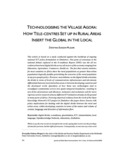Please use this identifier to cite or link to this item:
https://cris.library.msu.ac.zw//handle/11408/1884Full metadata record
| DC Field | Value | Language |
|---|---|---|
| dc.contributor.author | Mugari, Zvenyika E. | - |
| dc.date.accessioned | 2017-03-03T14:21:59Z | - |
| dc.date.available | 2017-03-03T14:21:59Z | - |
| dc.date.issued | 2009 | - |
| dc.identifier.issn | 1933-3218 | - |
| dc.identifier.uri | http://hdl.handle.net/11408/1884 | - |
| dc.description.abstract | This article is based on a study conducted against the backdrop of ongoing national ICT policy formulation in Zimbabwe. One point of consensus in the national debate captured in the E-readiness Report (2005) was the all too evident urban/rural digital divide across all sectors of the economy ranging from Education, Agriculture, Commerce, Health etc. The fact that country statistics for most countries in Africa show the rural populations as greater than urban populations logically justifies prioritizing the concerns of the rural population in any pro-people policy. However, most debates on the digital divide articulate the divide in terms of levels of communications infrastructure and tele-density differentials between rural and urban areas or between developing countries and the developed world. Questions of how these new technologies tend to reconfigure communities across new spatio-temporal boundaries, resulting in new forms of presences and absences, inclusions and exclusions call for more rigorous action research of many different ICT initiatives already on the groundin many parts of Africa. Drawing empirical evidence from the work of the Open Knowledge Network's ICT project in Zimbabwe this paper draws lessons with policy implications for dealing with the digital divide between the rural and urban areas within developing countries in terms of the nature and volume of content, language and direction of information flow. | en_US |
| dc.language.iso | en | en_US |
| dc.publisher | Journal of Global Mass Communication | en_US |
| dc.relation.ispartofseries | Journal of Global Mass Communication;Vol. 2, Nos. 3/4; p.74-87 | - |
| dc.subject | digital divide, e-readiness, glocalisation, ICT, intermediaries, local language, Openknowledge Network, telecentres, Zimbabwe | en_US |
| dc.title | Technologising the village agora: how tele-centres set-up in rural areas insert the global in the local | en_US |
| dc.type | Article | en_US |
| item.languageiso639-1 | en | - |
| item.openairecristype | http://purl.org/coar/resource_type/c_18cf | - |
| item.grantfulltext | open | - |
| item.fulltext | With Fulltext | - |
| item.openairetype | Article | - |
| item.cerifentitytype | Publications | - |
| Appears in Collections: | Research Papers | |
Files in This Item:
| File | Description | Size | Format | |
|---|---|---|---|---|
| mugari.pdf | Full Text | 8.77 MB | Adobe PDF |  View/Open |
Items in MSUIR are protected by copyright, with all rights reserved, unless otherwise indicated.



